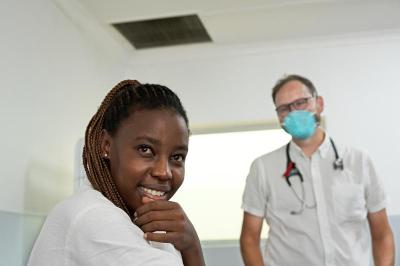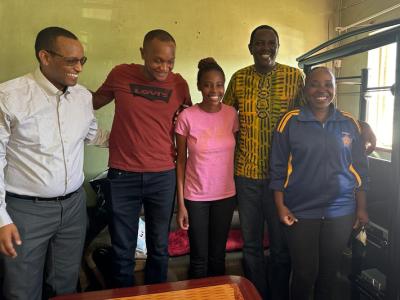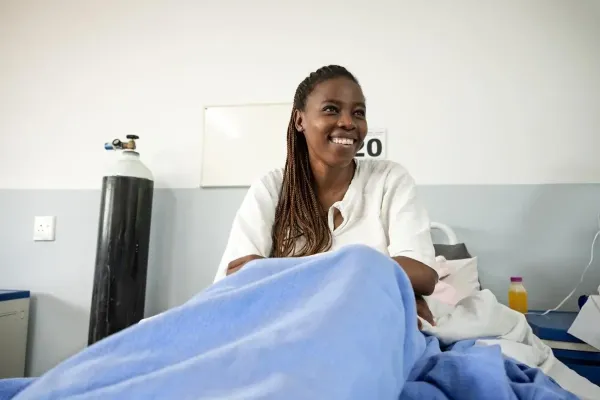Sarafina Makashane, 30, has always been driven by her dual passions: fashion design and software development. Instead of choosing one career path, she persistently pursues both, determined to make her mark in the seemingly disparate fields.
In 2023, Makashane began establishing herself in the fashion industry in South Africa. Her designs were gaining recognition, and she was excited about her future. Simultaneously, she was enrolled in a software development course.
Then, her journey took an unexpected turn when she began experiencing what she thought was simply a sore throat. Believing it was a minor illness and hoping to alleviate the discomfort, she purchased over-the-counter cough syrup and flu medication.
A Sudden Health Crisis
Within a few days, Makashane’s symptoms escalated to severe breathing difficulties and relentless vomiting. Alarmed by her rapid decline, she sought medical attention at a health center in South Africa. There, she received the devastating diagnosis: multidrug-resistant tuberculosis (MDR-TB). She was immediately put on treatment; however, her condition continued to worsen.
As her health declined, Makashane made the difficult decision to return home to her family in Lesotho. She knew she needed their support as she faced the biggest challenge of her life. While in South Africa, she was referred to Partners In Health (PIH)-supported Botšabelo Hospital, which is Lesotho’s only facility equipped to handle severe cases of MDR-TB.
“Getting MDR-TB is life-threatening. I didn’t think I’d still be alive considering how difficult it was,” Makashane recalls. “My life was horrible. I couldn’t even walk. I watched my entire life flash before me.”
Upon admission to Botšabelo Hospital, Makashane was placed on an 18-month treatment plan involving a combination of drugs. The side effects were harsh, with severe nausea, fatigue, and pain becoming part of her daily life. Tuberculosis (TB)—known to attack the lungs—caused a blockage in Makashane’s left lung, which required complex surgery. The procedure was necessary to save her life but added to her distress, leaving her with chronic pain and constant worry.

During her stay at Botšabelo Hospital, Sarafina Makashane received intensive daily care for MDR-TB, a deadly but curable infectious disease.
Photo by Joshua Benson for PIH.
Being in the hospital meant missing exams for her software development course, delaying her progress, and causing significant setbacks in her studies. Although frustrated, Makashane remained determined to continue her education as soon as her health allowed.
After three months at Botšabelo Hospital and two weeks in a PIH-supported MDR-TB halfway house, the time finally came for Makashane to head home.
Road to Recovery
Although well enough to leave the hospital, Makashane continues to recover. Every day, she follows a strict schedule to regain her strength and restore her health. Part of this routine includes walking to the nearby shopping mall; a simple, but significant activity. These walks are not just about exercise; they are also a source of fashion inspiration. As she strolls past store windows filled with the latest trends, her passion for design is reignited, motivating her to continue pursuing her dreams.
Since becoming ill, Makashane’s love for both software development and fashion design never waned. She is continuing with her online software development course, which is self-paced, allowing her to balance her studies with her ongoing treatment.
“After I’ve fully recovered, I plan to completely embark on a journey to fortify my fashion designing skills,” she says with a hopeful smile.
Treatment Supporter Litlhare Matlole, who received training at the halfway house, visits Makashane at least twice daily to ensure she is taking her medication. Matlole also provides much-needed companionship and emotional support, helping Makashane navigate the long and often lonely road to full recovery.
With the right care and treatment, TB is curable.
“Awareness, early diagnosis, and adherence to treatment are crucial. Sarafina’s journey is a reminder of the importance of these elements and the incredible strength it takes to endure such a battle,” says Dr. Ninza Sheyo, PIH Lesotho’s intensive care unit specialist and a key member of Makashane’s care team.

Sarafina Makashane (center) with members of her tuberculosis care team at her home in Maseru, Lesotho. From left to right: PIH Lesotho Chief Medical Officer Dr. Afom Andom, PIH Lesotho Intensive Care Unit Specialist Dr. Ninza Sheyo, PIH Lesotho Executive Director Dr. Melino Ndayizigiye, and Treatment Supporter Litlhare Matlole.
Photo by Mpho Marole / PIH.
TB typically affects adults in their most productive years, according to the World Health Organization; however, people of all ages are at risk. Lesotho, with a population of around 2 million, has one of the highest TB incidences globally, with an estimated 661 cases per 100,000 people. Despite being treatable and preventable, TB remains a leading cause of death in low- and middle-income countries, with more than 1.3 million people dying in 2022 alone.
PIH Lesotho plays a critical role in combating TB, providing not only medical care but also social support to patients. This support includes food for patients undergoing taxing treatment regimens, temporary housing at the MDR-TB halfway house for those who cannot travel to the hospital daily, and stipends for transportation. The goal is to treat the whole patient, not just their condition.
“Every day I feel a bit stronger,” Makashane says. “I’m grateful for the support I’ve received from PIH and the chance to chase my dreams again. MDR-TB tried to take my life, but it won’t take my spirit.”
